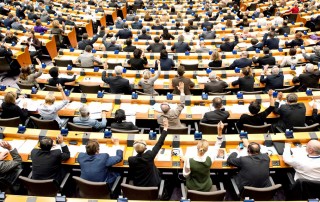EMPODERANDO AL PERIODISMO A TRAVÉS DEL DERECHO DE ACCESO A LA INFORMACIÓN
EL MANUAL ‘LEGAL LEAKS’ AYUDA A PERIODISTAS A OBTENER
INFORMACIÓN USANDO LAS LEYES DE ACCESO A LA INFORMACIÓN
Why is the right of access to information important for journalism?
A Guide for Journalists on How to Access Information
The Legal Leaks Toolkit, developed by Access Info Europe and n-ost, helps journalists access information using Access to Information laws. The Toolkit is available in a generic international version and can be adapted to the legal framework of any country. The existing national versions, translated into local languages, are available below. You can also read more below about our training programme and about how to contact
the Legal Leaks Help Desk.
Why do media experts think access to information is important?
Journalists, activists, and media experts speak about the importance of access to information in their daily work. Watch all interviews here!
That little detail in the relationship between journalists and sources, that little one, is so important that could change the way in which we tell stories.
It is extremely important that there is this mechanism that you can use as a journalist to say «Hang on a minute, you need to give us this, because we have a right to know».
It’s a great way to get stories, it’s a great way to fin out what governments in particular are doing, it’s a great way to find out where money goes, it’s a great way to prove accountability.
The right of access to information is very important for the journalists’ work; it’s important for everyday work, but it’s even more important for investigations.
Journalism is about investigation, it’s about asking questions; but it’s about documents as well, as a proof for questions, as a proof for answers
Basically, I need access to information to do my job as someone who is supposed to ensure the accountability of politicians, of public officials.
Cover photo: European Parliament via Flickr (CC BY-NC-ND 2.0)
ÚLTIMAS NOTICIAS SOBRE EMPODERANDO AL PERIODISMO
Jornadas sobre el Acceso a los Documentos en la UE y más allá
Fecha: 20-21/11/2017 Lugar: Bruselas
Jean-Claude Juncker’s chartered jet junket cost taxpayers €27,000
The Times | 10/08/20017 Inglés - The cost of chartered flights to transport EU commissioners and their entourages around the world makes up the bulk of the Brussels executive’s travel expenses. Leer más...
Jornada sobre “La aplicación de las nuevas Leyes de transparencia: balance y perspectivas de futuro”
Fecha: 27/10/2017 Lugar: Facultad de Derecho de la Universidad de Sevilla
El acceso a la información genera cambios: los fructíferos resultados de una sola publicación: Actas del Gabinete + periodismo de datos: se revelan los pagos irregulares
LOS FRUCTÍFEROS RESULTADOS DE UNA SOLA SOLICITUD AGENDAS DE GABINETES + PERIODISMO DE DATOS REVELAN PAGOS IRREGULARES En marzo de 2017, el destacado periódico español El Confidencial publicó un exclusivo reportaje que revelaba la aprobación por parte del Consejo de Ministros de contratos con irregularidades. Este reportaje fue posible gracias a una única solicitud de acceso a
Review process tackling MEPs allowances avoids public scrutiny
Madrid, 17 October 2017 - Access Info Europe has criticised the European Parliament’s refusal to disclose information in full relating to the revision of Member of the European Parliament’s General Expenditure Allowance (GEA), following an access to EU documents request. The Parliament Bureau’s ‘Ad hoc Working Group on the GEA’ denied access to a note containing the background, advice, and
Empleo no quiere que conozcas detalles del medio millón de accidentes de trabajo al año
El Confidencial | 15/10/2017 Español - El ministerio de Fátima Báñez ha llevado a los tribunales al Consejo de Transparencia para ocultar esta información. De los 67 juicios de este tipo, 46 han sido iniciados por la Administración. Leer más...

